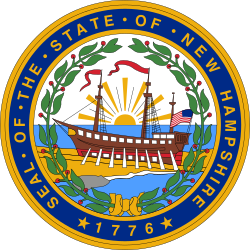March 10, 1964 | ||||||||||||||||
| ||||||||||||||||
 County results Johnson | ||||||||||||||||
The 1964 New Hampshire Democratic presidential primary was held on March 10, 1964, in New Hampshire as one of the Democratic Party's statewide nomination contests ahead of the 1964 United States presidential election.
Incumbent President Lyndon B. Johnson, who faced no opposition other than write-ins, [2] easily won the primary. [3] He earned the largest percentage of the popular vote for any Democrat in the history of the New Hampshire primary. Robert F. Kennedy, former United States Attorney General and brother of late President John F. Kennedy, came in second place with 1.6% despite decling to run. Johnson would go on to win re-election against Republican Barry Goldwater by an overwhelming landslide.
| Elections in New Hampshire |
|---|
 |
George Lincoln Rockwell, founder of the American Nazi Party was removed from the primary in February 1964. [4]

